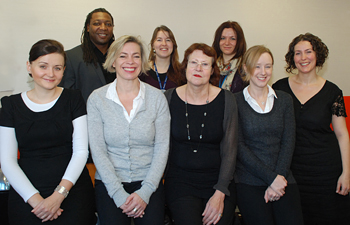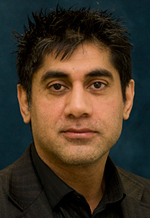New programme will help international students adapt to Uni life
Fri, 10 Jan 2014 10:56:00 GMT
The International Learning Support Programme will ensure international students realise their full potential

 Pictured with Jo Thomas (front row, second left) are team members (l-r) Kinga Rygiel, Richard Dockray, Emily Treece, Kate Connery, Chrissie Woods, Heather Nicholls and Jodi Gregory.
Pictured with Jo Thomas (front row, second left) are team members (l-r) Kinga Rygiel, Richard Dockray, Emily Treece, Kate Connery, Chrissie Woods, Heather Nicholls and Jodi Gregory.
A NEW team of specialist advisers is helping to ensure that thousands of overseas students adapt quickly to life at the University of Huddersfield and leave with the best possible degrees.
The International Learning Support Programme is an innovation unique to Huddersfield, which has enjoyed huge success in overseas recruitment. Now the challenge is to ensure that the 2,000 students who come from non-EU countries get the most out of their time at the University.
When they attend the free weekly classes provided by the ILSP, undergraduates and post-graduates from countries and continents such as China, Africa and Asia will have extra help with language skills, learn about life at Huddersfield, and receive advice on how to structure assignments, write dissertations and prepare for exams.
In this video, international student Asadul Chowdury, who is studying for a MSc in Economics, explains the benefits of the International Learning Support Programme.
The Programme is headed by Learning Support Manager Jo Thomas, whose varied career has included the ownership of language schools geared up to help overseas students prepare for study in the UK and the USA.
She explained that the ILSP was a response to the University of Huddersfield’s new strategy to increase the numbers of all students who achieve first class and upper second degrees.
“We will be supporting the international students, helping them all to adapt quickly and achieve their full potential,” she said.
Language skills were a key area, but other issues, including the educational culture at a UK university, were also crucial.
“They need an understanding of how assessments work in UK Higher Education institutions and how to manage their workload.
“Also, they might not be used to the fact that they have to work very independently. They might be more accustomed to being very closely directed, while we expect more autonomy from the students.”
The amount of academic reading expected is also a challenge, said Jo, and there is a greater emphasis on critical thinking in UK institutions. In addition, some overseas students had to cope with factors such as homesickness or practical issues such as cooking and cleaning for themselves for the first time.
The ILSP has a team of seven full-time and two part-time staff and the innovative system has now completed its first full term. Students who have joined its classes have provided very positive feedback, said Jo, but the Programme was constantly being re-evaluated and fine-tuned.
“We are expanding our knowledge of the students and what their needs are - whether it is language and academic support, or whether it’s integration and fitting into the UK. Even though we have 2,000 non-EU students and we are a small team, we are finding a way of treating each student as an individual.”
 The University of Huddersfield’s Business School has been particular successful at overseas recruitment, and was instrumental in the University receiving a Queen’s Award for International Trade. The ILSP originated as an initiative by lecturer Mohammed Mirza (pictured right), who is director of international development at the Business School and it received the backing of Professor David Taylor, who is the University’s Pro Vice-Chancellor, International.
The University of Huddersfield’s Business School has been particular successful at overseas recruitment, and was instrumental in the University receiving a Queen’s Award for International Trade. The ILSP originated as an initiative by lecturer Mohammed Mirza (pictured right), who is director of international development at the Business School and it received the backing of Professor David Taylor, who is the University’s Pro Vice-Chancellor, International.
Jo Thomas was already based at the University, initially working for the educational organisation Study Group, which has delivered a special course for international students. She transferred to the Business School’s Learning Development Group before becoming manager of the new International Learning Support Programme.







